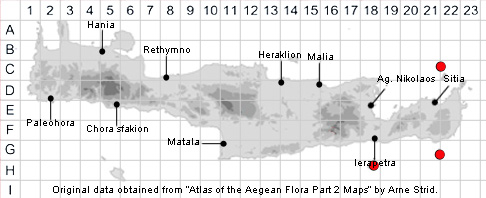SPECIES DESCRIPTION
CISTANCHE PHELYPAEA
Family and Genus:- See- OROBANCHACEAE
Common Names:- None
Homotypic Synonyms:- Lathraea phelypaea, Orobanche phelypaea.
Meaning:- Cistanche (Gr) Cistus-strangler
Phelypaea (L) For Louis Phelipeaux, Count of Ponchartrain,
Tourneforte's patron.
General description:- Glabrous annual.
Stems:-
1) Generally 30-80 cm tall, stout and fleshy,
Leaves:-
1) Scale-like, c. 2 cm, ovate-lanceolate, obtuse, brown, with a scarious, more or
less denticulate margin.
Flowers:-
1) Spike, rather dense, 10-20(-30) cm.
2) Bracts, 15-20 mm, crenulate, glabrous;
a) bracteoles, ovate-lanceolate, glabrous. much shorter than the flowers.
3) Calyx, 13-18 mm, with short, ovate-orbicular, crenulate lobes.
4) Corolla, 30-40(-60) x 20-30 mm, bright shining yellow, tube curved;
a) limb, with 5 broad, subequal lobes.
5) Stamens, equalling the corolla, recurved at the apex;
a) anthers and filament, bases villous, anthers with acute lobes.
6) Stigma, large, yellowish.
Fruit:-
1) Capsule, c. 12 mm, ovoid.
Host:- On roots of Atriplex halimus, probably also Arthrocnemum macrostachyum,
Sueda vera and other shrublets.
Key features:-
1) Bracts and bracteoles, glabrous.
2) Corolla, bright yellow.
Habitat:- In maritime sand.
Distribution:- In Greece known only from the Aegean area. - A N African desert
element extending to W Syria and reaching Europe in Spain and S Portugal. Rare
on Crete, known only from the eastern islands of Gianysada, Koufonisi and Chrysi.
Flowering time:- Mar-June.
Photos by:- Kind permission of Saxifraga - Free Nature Images & Wiki-Commons
